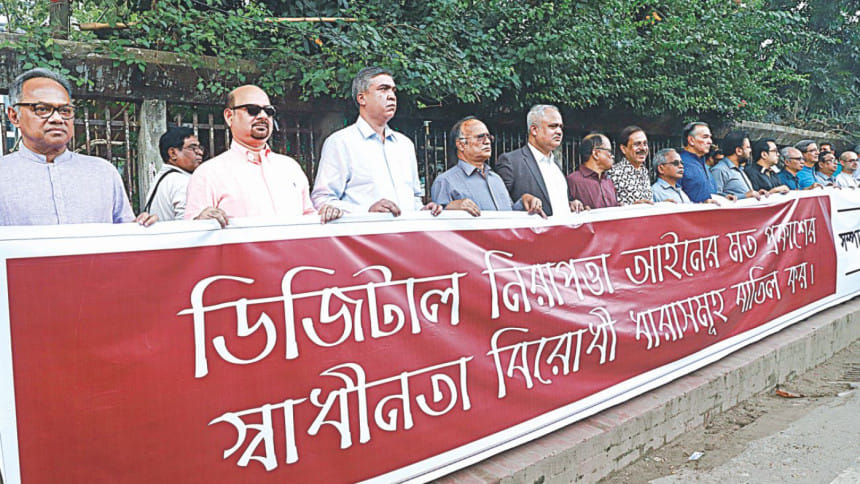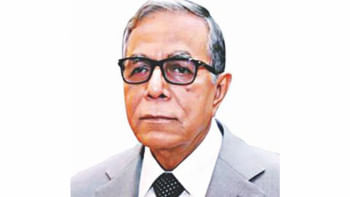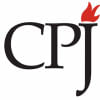Amend nine sections of Digital Security Act

Editors of the country's leading newspapers yesterday took to the streets and formed a human chain to press for proper amendments to nine sections of the much-debated Digital Security Act.
At the prescheduled programme in front of the capital's Jatiya Press Club, the Sampadak Parishad (Editors' Council), a platform of editors, reiterated its demand that the sections be amended to protect independent journalism and freedom of expression.
Holding a banner, the Parishad members also demanded that the proposed changes be made in the upcoming and last session of the current parliament, scheduled to begin on October 21.
The sections in question are 8, 21, 25, 28, 29, 31, 32, 43 and 53.
“We think the Digital Security Act is an obstruction to press freedom,” Mahfuz Anam, general secretary of the Parishad, told the human chain after it started around 11:15am.
“If the law remains in force, none of us -- the press media, television [channels], and the online media -- will be able to do our professional duty independently,” he said.
The Parishad members continued the demonstration for some 10 minutes and prior to that Mahfuz Anam, also editor and publisher of The Daily Star, made a brief speech on behalf of the editors. He read out a written statement containing their seven-point demand.
“We hope the government will accept our demands and make the law an acceptable one for all through bringing required amendments to it,” he added.
Amid widespread criticism, President Abdul Hamid signed the Digital Security Bill into a law on October 8.
Termed draconian at home and abroad, the bill was passed in Parliament on September 19, ignoring concerns of journalists and rights defenders and keeping a harsh provision that allows police officials to search or arrest anyone without warrant.
Some of the sections in question deal with concerns like giving arbitrary power to law enforcement agencies to confiscate media contents, vagueness in the definition of “Spirit of the Liberation War”, shrinking scope for investigative journalism, and limiting scope to write against socio-religious harmful elements such as unlawful fatwa.
The Parishad postponed a human chain scheduled for September 29 at the request of Information Minister Hasanul Haq Inu, who also promised to bring the law minister and the posts, telecommunications and IT minister to a discussion with the editors on September 30.
The three ministers, in the September 30 meeting, publicly committed to taking the editors' concerns to the cabinet meeting either on October 3 or the next one on October 8, the Parishad said.
The ministers also promised to seek the cabinet's approval for resuming discussion with the editors and that all efforts would be made to work out a version of the law acceptable to all concerned, it added.
“Regrettably, neither such efforts were made, nor were we extended the courtesy of being informed by any of the ministers as to why they failed to keep their promise,” read a recent statement from the Editors' Council.
Without mentioning any name, Mahfuz Anam, at yesterday's demonstration, stated that different ministers said the door for further discussion has not been closed yet. The editors also don't believe that the door is closed, he said.
“However, farce in the name of discussion shouldn't take place,” he said, pointing to the Parishad's previous meeting with three ministers that bore no fruit.
“We attended [the meeting] with intense belief.
“However, such belief has not been paid off. We are pleased that they [the ministers] said the door is still open. We want to discuss but it has to be a credible discussion which will lead to a solution and not be just for the sake of discussion.”
The editors who participated in yesterday's human chain are Khandaker Muniruzzaman, acting editor, Sangbad; Matiur Rahman, editor, Prothom Alo; Shyamal Dutta, editor, Bhorer Kagoj; Nurul Kabir, editor, New Age; Imdadul Haq Milon, editor, Kaler Kantho; Matiur Rahman Chowdhury, editor, Manabzamin; Naem Nizam, editor, Bangladesh Pratidin; Mahfuz Anam; AMM Bahauddin, editor, Daily Inqilab; Md Mozammel Haque, editor, Karatoa; M Shamsur Rahman, editor, The Independent; Saiful Alam, acting editor, Jugantor; Dewan Hanif Mahmud, editor, Bonik Barta; Zafar Sobhan, editor, Dhaka Tribune; Mustafiz Shafi, acting editor, Samakal; and Shahiduzzaman Khan, acting editor, Financial Express.
PARISHAD'S DEMANDS
Sections 8, 21, 25, 28, 29, 31, 32, 43, and 53 of the Digital Security Act must be amended appropriately to safeguard the freedom of the media and the freedom of speech.
The government must bring the amendments in the last session of the present parliament.
In cases of conducting search in any media institution, police or any other agency should only be permitted to block specific content but not to shut down any computer system. They will be allowed to block any publishable content only after discussion with the editor of the related media institution and only if they can show logical ground on why such content should be blocked.
Advance court order must be obtained to block or confiscate any computer system of any media institution.
In cases of offences relating to journalistic duties by media professionals, they must be issued summons to appear before a court [as is the law now], and under no circumstances should media professionals be detained or arrested without a warrant and due process of law.
In instances of offences made by media professionals, the primary investigation must be conducted by the Press Council. For this purpose, the Press Council may be strengthened.
The primacy of the Right to Information Act, passed by this government, should be unequivocally established above the Digital Security Act. All freedom and rights granted by the law to citizens and the media must be protected.

 For all latest news, follow The Daily Star's Google News channel.
For all latest news, follow The Daily Star's Google News channel. 










Comments